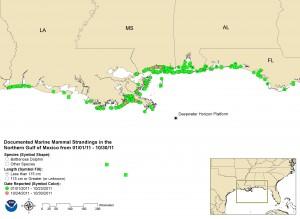Ten bottlenose dolphins that died in the Gulf of Mexico recently were found to have been infected with the bacteria Brucella. They are among the nearly 600 dolphins that have died in the Gulf since February 2010. Due to the high number of deaths, NOAA has declared an "unusual mortality event," triggering a focused, expert investigation into the cause.
NOAA hired pathology experts to determine the cause of these deaths. Ten dolphins were diagnosed with Brucella infections, called brucellosis. Nineteen other dolphins were tested but came back negative. Brucellosis can cause fetal death and miscarriage, pneumonia, and infections of the bone, skin, and brain in dolphins.
Useful Links
- Keep up-to-date on the ongoing investigation
- Read a fact sheet about Brucella infections in whales and dolphins (pdf, 76 KB)
We're still investigating the causes of the other dolphin deaths, and trying to determine what role the Deepwater Horizon oil spill may have played.
"Die-offs from bacterial infections could be occurring—or be more severe—because the dolphins are more susceptible to infection. Severe environmental stress, including from exposure to oil, could have reduced the animals' ability to fight infection," said Teri Rowles, DVM, Ph.D., coordinator of NOAA's National Marine Mammal Health and Stranding Response Program.
Right now, we don't have enough information to definitively link the deaths to the oil spill. NOAA is working with a team of marine mammal health experts, including veterinarians, epidemiologists, biologists, and toxicologists, to investigate the cause of death for as many of the dolphins as possible. The findings may take years to complete, but will be made public when appropriate.
Brucella bacteria are often found in animals, but infection in humans is rare in the United States, and there are no documented U.S. cases of humans contracting Brucella from marine sources. If you see a stranded dolphin in the Gulf of Mexico region, call 1-877-WHALE HELP (1-877-942-5343).


